Spain’s Preferences in Budgetary Reform
Spain holds a key position in discussions on reforming the EU budget. Unlike any other country, it has undergone an extraordinary transformation: from being the largest net beneficiary in absolute terms in the period 2000-06 to being a potential net contributor starting in 2014. One of the factors in this evolution was the country’s outstanding economic development of recent years, which gave Spain a budgetary situation considered one of the best in the euro zone (see Map I in the Annex). Another factor was the virtual rise in the EU’s per capita GDP as a result of the incorporation of 12 new member states. This increase, known as a ‘statistical effect’, was one of the key issues in the last round of financial prospect negotiations.
Now a debate is under way at the European level on revising the budget and EU policies. This budget review process stems from the conclusions of the EU summit held in December 2005.[1] The conference held in Brussels on 12 November of 2008 marked the end of the public-debate phase that began with the European Commission’s presentation of an issues paper in September 2007. It also marked the beginning of a new phase in which the Commission is expected to present a White Paper in mid-2009, with discussion later among EU leaders.
In this context, it is possible the Spanish government’s position on budgetary reform and in ensuing negotiations on financial prospects after 2014 will be different from that which it held in earlier discussions on budgetary issues. Spain is currently in a unique situation and alert to any changes that might be introduced in terms of spending and revenues. Although Spain has been a net beneficiary of EU funds since it joined the bloc, one can expect that, starting in 2013, it will achieve a net balance that is in equilibrium with regard to the EU. Thus, any budgetary reforms that are agreed will have a significant effect on Spain’s bottom line. Reforming the income-and-spending aspect of the EU budget takes on special importance for Spain because of the important financial implications that such changes might have in the context of future negotiations.
Thus, the net balance depends not just on the future of the cohesion policy and possible new policies, but also on reforms of the Common Agriculture Policy (CAP), a hugely important part of the EU budget. ‘In fact, we now receive more for agriculture than in structural funds, and that trend is going to continue in the coming years to the tune of €35,000 million’.[2]
On the other hand, the new position could be seen as a comfortable spot from which to launch initiatives, mainly in discussions on new policies, including the role played by the Lisbon Strategy, and on the future of the cohesion policy. This makes one think the Spanish government might try to take advantage of its position and aim its focus on overall debate covering both EU revenues and expenditures in order to keep all its options open. This idea is reflected in the Spanish document that serves as the official response to the process of consultation launched by the Commission.[3] This document stresses two lines or basic principles: fairness in revenues and quality in expenditure.[4] This argument does not come out of nowhere. It is based on the position held in negotiations on financial prospects for the period 2007-13, in which the principles of fairness, sufficiency and gradualness[5] were given priority. That stance also backed up the paradigm of the government of Prime Minister Jose Luis Rodríguez Zapatero to the effect that ‘Spain has returned to Europe’. In these last negotiations, new priorities to defend were introduced and they stem from new policies and challenges, such as renewable energies, sustainable development, and in particular investment in research, development and innovation (R+D+I).
It should be recalled that, with the so-called Technological Fund within the FEDER, the Spanish delegation managed to strengthen one of its priorities in the year 2005. It was not just due to this fund. Thanks to efforts at the national level, in recent years spending on R+D+I in Spain increased around 100%, achieving in 2007 a record of €6,450 million.[6]
In order to highlight the importance that the Spanish government attaches to bridging the technological gap that exists among the countries of the EU, along with the increase in budgetary resources available for R+D+I, the government has beefed itself up in this regard. Signs of this priority are the naming of a coordinator from the Spanish government to address the Lisbon Strategy, ‘Mr Lisbon’, or the creation of a new Ministry of Science and Innovation, as well as Spain’s efforts to serve as headquarters for the European Institute for Innovation and Technology.
However, as shown in Maps II-IV of the Annex, in order to overcome the distance between Spain and the most developed countries of the bloc, even more efforts are needed, as is a new concept of ‘solidarity’ within the EU.
In any case, the future negotiations will have to take into account the fact that, since the beginning of the talks on the Financial Prospect for 2007-13, Spain has defended three basic principles, which are still valid. At the outset of the process of revising the EU budget,[7] the question is in what direction EU spending and income policies should evolve, from the point of view of a country like Spain.
In the first place, there is the ‘principle of sufficiency of budgetary means’. The budget that the EU approves for the next programme period post-2013 should respect this idea in order to guarantee achievement of the Union’s objectives and let it confront successfully the challenges of the future, such as immigration and technological innovation. For this reason, as stated in the Spanish response to the issues paper, it will be essential to develop a European immigration policy with specific goals and a budget with enough funding to respond to a challenge that the entire EU must face in a coordinated and all-encompassing fashion.
As for the challenges in innovation in the equation R+D+I, it is a question of narrowing the ‘technological gap’ that exists between the more advanced and less advanced member states. Spain is among the latter. The goal must be to encourage and complement the efforts of those member states which are striving to join, as soon as they can, the leading group of European countries in the field of research and innovation.
Secondly, in the last round of negotiations another argument used was the ‘principle of fair distribution of the costs of enlargement’. The idea was for the principle of fairness to be observed in contributions to the EU budget. This principle of fairness in contributions is one that will remain up for discussion in the budgetary reform process and one which Spain has defended from the outset.
Finally, in application of the ‘principle of gradualism’, in the last negotiations Spain defended the need for adequate transitional measures for those regions which lose their eligibility for the Cohesion Fund, either because of a ‘statistical effect’ or through natural growth. This principle, which has been broadly applied throughout the history of the EU, must be maintained.
This basic position, consistent with Spain’s clear drive to be a part of a united Europe, extends to the budgetary review process that is underway. Thus, the principle of fairness in revenues is complemented with the principle of quality on the spending side.
Public opinion is crucial in shaping the arguments of the governments of member states in financial negotiations, be they net contributors or net recipients. Ever since Spain joined the European Community, support among the Spanish people for the idea of integration has been above the European average. And the proportion of those who think EU membership is beneficial for the country is also well above the European average. According to a recent Eurobarometer survey, Spaniards are among the Europeans who claim to have the best knowledge of how EU policy helps their city or region (62%) and among those who are most pleased with the effects of this policy (84%). However, the pro-European sentiment of Spaniards is not just a direct consequence of all the benefits: on one hand, it is sensitive to the national economic situation, in the sense that when the Spanish unemployment rate goes up, public opinion not only feels that the country receives fewer benefits but also has a less enthusiastic feeling about EU membership. On the other hand, pro-European sentiment also depends on political cycles. The less satisfied people feel with democracy, the less enthusiasm they feel for Spain’s integration with the continent and its being a member of the EU (Barreiro & Sánchez, 2001, p. 50).
With regard to Spaniards’ knowledge of the budget, one thing that stands out is the high percentage of people who could express an opinion (32%), a figure well above the European average (see Graph 1). Data from 2006 show that 28% of those polled believed administrative costs accounted for the biggest part of the budget and only 9% knew that the Common Agricultural Policy was the main category during the 2000-06 financial framework period.
Graph 1. In which of the following do you think the largest part of the EU budget is spent?
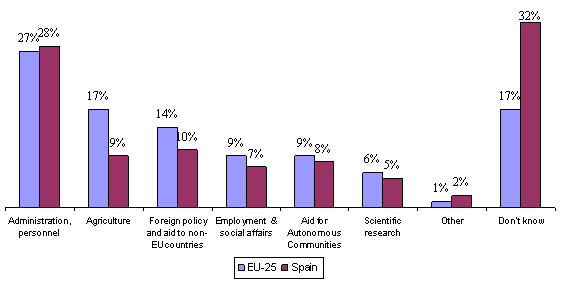
Graph 2. The EU budget in the financial period 2007-13
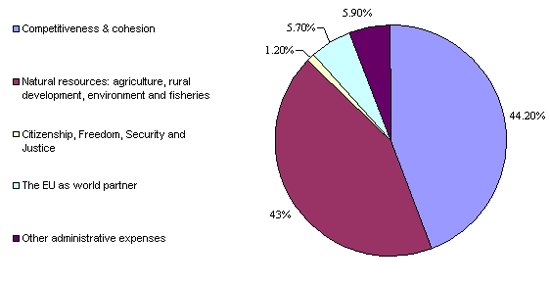
Revenues
In the past few years, Spain’s contribution to the EU budget has become larger and larger. This stems in part from the country’s economic prosperity. But is it also a result of an increase in the impact of correction mechanisms, which at the same time leads to a rise in the contributions made by other member states. In this context, and with the possibility that Spain at some point will become an excessive net contributor, Spain will insist on fairness in revenues as an essential principle of the EU’s new system for managing its resources. The idea of this principle is that each member state’s contribution should depend on its level of wealth and prosperity.[8] If one follows the principle of fairness, this rejects any of the existing correction mechanisms because their effects go against the principle. As in previous negotiations, one of the main areas of discussion will be the ‘British rebate’, both because of the growing increase of the Spanish contribution toward financing the rebate and because of its distorting and inequitable effects on the budget in general, which were not justified in that context. In the final agreement reached in December 2005, and under pressure mainly from Spain and France, a commitment was obtained to reduce the British rebate and it was agreed that Britain would take part in financing the costs of EU enlargement.
As we have already said, in recent years Spain’s contributions to EU coffers have grown at a rate higher than the European average. So with the goal of avoiding unfair contribution levels and improving the transparency of EU financing, some analysts have proposed having countries’ contributions converge at a level of around 0.8% of GNI.[9]
As for how contributions are assigned among the different member states, currently the system produces a situation that is not equitable.[10] Some members, such as Spain, whose per capita GDP barely reaches the EU average, still make contributions to the EU budget that are much larger (in terms of GDP) than those of other member states, such as Britain, which far surpass the average levels of prosperity in the EU.[11]
In light of this situation, and from Spain’s point of view in terms of its contribution to the review process, if no prior debate is carried out on the current fundamentals of the system of inputs and their fairness, it will be hard to reach agreements on a revision of spending policies.
Graph 3. Financing of the budget per member state (% GDP)
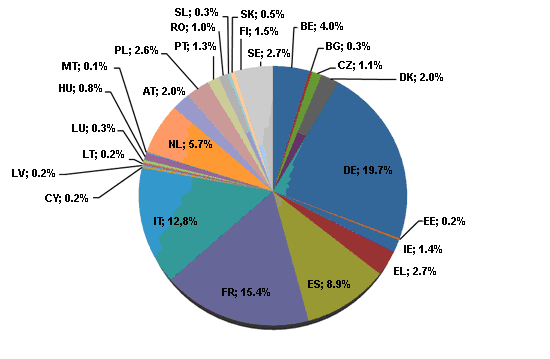
Spending
Meanwhile, with regard to EU spending, one must keep in mind that some member states are exerting pressure to nationalise certain policies. This could lead to a tendency in which the Commission presents major budgetary reform proposals, and in particular the Common Agricultural Policy. One must not forget that this policy and the Cohesion Policy have benefited Spain tremendously so far. But it is also true that the Spanish position is focusing on the future.
The second goal included in the Spanish position is to achieve maximum quality in spending and prepare the EU for emerging challenges such as immigration, demographic change and climate change, which are mentioned in the Commission report.[12]
In any case, Spain’s traditional commitment to the principle of cohesion as an expression of the principle of EU solidarity will continue (Navarro & Viguera, 2005). According to the Spanish government, ‘[…] cohesion policy should continue to play a relevant role in the future of EU policies […]’,[13] both to contribute to EU economic growth policies and aid less-developed regions as well as to contribute to the development of geographic areas and cities which have distinctly specific characteristics within the EU, such as ultra-peripheral regions,[14] rural areas with low population density and cities that lie on borders.[15] In order to support the process of convergence, in the last round of negotiations there was agreement on continuing transitional measures (phasing-out) for regions that will not be eligible in the next financial framework and on a boost in resources for cross-border cooperation.
With regard to the budgetary revision, the Spanish contribution also mentions other formulas for achieving cohesion, in such areas as technology and the environment. Thus, the future cohesion policy must support the Lisbon process and within this process be based on investment in R+D+I[16] because, if the existing technological gaps within the EU are not eliminated the bloc cannot meet the Lisbon objectives.[17]
Furthermore, as far as regional policy is concerned, Spain’s position as the second-largest recipient of funds will change starting in 2014, since the convergence goal will gradually be abandoned and the phasing out of the Cohesion Fund will be completed. Therefore, the direction of the future cohesion policy must encompass all EU territory and centre on the priorities set in Lisbon.
The persistence of major regional and/or national imbalances marks a major obstacle for the overall prosperity of the EU and affects the Lisbon Strategy goals of transforming the EU into a competitive economic power. Cohesion and economic competitiveness are more and more closely linked and generate positive synergies.
The novelty of Spain’s position lies in the fact that it no longer stresses just cohesion, but also EU policy on R+D. The need to redirect spending toward the Lisbon goals makes it clear that this is not just an exercise at the regional level, but also the national one and especially at the level of the EU as a whole. In a bloc now made up of 27 member states, what is emerging is a group of countries which, although they are near average EU levels of prosperity and well-being, are still far from the most advanced levels of development in technology and innovation. Also, at a domestic level they are making a major effort to develop their R+D+I capability and link it with the technological programmes of the EU. For this reason, in the revision of the budget it will also be necessary to address a revision the EU R+D+I policies currently included in category 1 a, which are the ones which have a direct effect on the competitiveness of the EU and its member states.18]
In line with this, under the term ‘European added value’, one refers not only to goals stemming from the EU treaty, such as social and economic cohesion, but also policies that have positive synergies and benefit a large number of countries. These new policies could be the challenge and the key point in the future budget reform, given the fact that Spain –in terms of immigration and energy as well as climate and demographic change– is a country that is especially affected. In this sense, many Spanish regions will increasingly have to confront possible effects of climate change, which will cause serious problems for farming, fishing and tourism, such as heat waves, drought and forest fires. According to the fourth report on economic and social cohesion, four European countries (Cypress, Malta, Italy and Spain) currently suffer from water shortages in the sense that the amount they use surpasses 20% of their available reserves, and global warming will reduce precipitation and raise temperatures in those countries, intensifying problems of scare water.[19]
As we have stated earlier, Spain is the second large recipient of funds from the EU’s Common Agricultural Policy. The resources that come from this policy exceed those stemming from structural funds and cohesion in the period 2007-2013. For this reason it is to be expected that the Spanish government will look very closely at any initiative that seeks to reform this policy. Government officials have already said that changes in the common agriculture policy’s ‘medical check-up’ must be ‘[….] minimal, as this is not the time for major reforms […]’.[20]
In this spirit, and in contrast with the aforementioned pressure to renationalise the CAP, the Spanish stance features a series of elements to keep in mind: the idea of food independence, food security and the multi-functional nature of the CAP should not be forgotten in the framework of the debates that are conducted.
At the same time, so far the CAP has guaranteed free circulation within the internal market and an EU system of management and control of aid, which ensures food quality.
As we have stated, along with interest in the traditional categories of the European budget, there are also preferences in policies which until now did not have enough resources. As part of its drive for a common immigration policy, Spain wants the EU to have an appropriate budget that features financing for the Frontex agency, tasked with monitoring the bloc’s external borders.[21]
The priority that the Spanish government places on development aid could also affect the budgetary review process. In 2004, Spain established an ambitious five-year timetable for achieving the goal of earmarking 0.5% of GDP for humanitarian aid in 2008 and thanks to this ‘road map’ it was the country that most increased its development aid spending in 2007. This commitment can be considered as exemplary for the rest of the bloc’s countries and an incentive to strengthen the role of the EU in this area.
Graph 4. Budget balance per member state (% GDP)
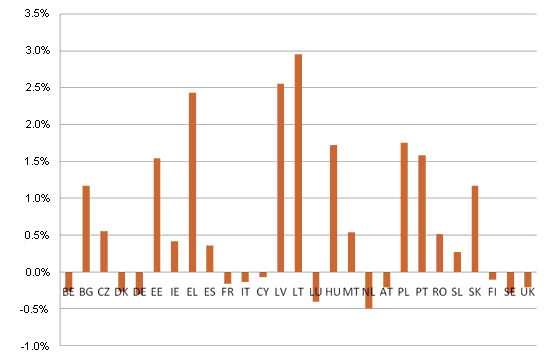
Spain’s Negotiating Strategy
The term ‘negotiating strategy’ is generally understood to refer to how a party approaches problems and conflicts and its interaction with other parties when it comes to resolving them. In that sense, a strategy consists of a specific order of possible kinds of behaviour, which at the same time carry with them different tactics. From a variety of studies[22] one can extract different strategies that can be summarised mainly in two categories. First, there is negotiating behaviour with a high potential for conflict and based on demands that are ambitious and not very realistic, and on retaining benefits that have already been acquired. Secondly, there is a consensus-seeking behaviour centred on the common interest and characterised by flexible positions.
Both strategies are implemented with the following tactics:
- Coalitions maintained or established during the negotiating process (heterogeneous or homogeneous, either established in ad hoc fashion for a specific area of negotiation or traditional, coalitions meant to defend or strengthen new initiatives).
- Initiatives presented during the negotiations (unilateral or multilateral; consensus-based or polarising, spontaneous or done in reaction to another initiative).
- Mediating skills and ability to be flexible in one’s position.
- Reactions to compromises (consensus-based or based on threats and pressure).
- Degree and purpose of expression of national interests (before Parliament, in elections or in public debate) and difference between how this is expressed at the European level and the national level (national interests or EU priorities).
- Timing and focus of expression of threats (at the outset or end of the negotiations, directed at a specific country or across the board).
There are different variables which can determine the choice of a specific strategy, such as the size of the State, its relative weight in the EU economy, whether it has domestic conflicts, public opinion on European integration and its administrative structure. Other factors are the relationship between a State and the EU’s policies on distribution (for instance, the relationship between France and the budget/CAP) and the net outcome it derives from the EU budget, as well as the degree of institutionalisation of the negotiating context. At the same time, negotiating strategies can change in intensity during the process and among the different levels of the negotiation. While some variables can be considered static, such as the size of a country, others can change and in turn modify a State’s strategy. And this, in turn, has repercussions on the relationships among the parties who are negotiating.
As for Spain, we have said that the economic situation and the way in which the country benefits from EU distribution policies, especially the cohesion policy, have changed recently. For this reason Spain holds a key position in the current discussions on revising the EU budget. Spain’s strategy in the debate on this reform, and, with even more emphasis, in the negotiations on the next financial framework, should therefore adapt both to the new Spanish economic situation in comparison with other countries and the possible effects of the challenges mentioned in the Commission report or other global problems or initiatives that might arise over the course of the debate.
The change in Spain’s perception of the EU and vice-versa, and the change in the country’s relative weight within the Union, must necessarily be reflected in an evolution of Spain’s position, one that moves toward initiatives which can benefit the country, both directly and indirectly.
These are not novel conclusions. The strategy that was followed in the negotiations on the financial prospect for 2007-13 established the foundations for this new reality. In this sense, the negotiating strategy does not require an abrupt change, but rather can be based on continuing the previous line of argument.
In this context, the Spanish position with regard to revising the budget retains the strategies employed so far:
- First, defence of the principle of fairness in revenues and the principle of quality in expenditures, highlighting the importance of technological progress and policies linked to the Lisbon Strategy.
- Secondly, parallel discussions of policies (including the CAP) and resources intrinsic to the EU budget (for instance, the ‘British rebate’).
Spain’s negotiating style is considered exemplary, both because of its efficient internal coordination and the external representation of its negotiating position and its skill in managing coalitions. As for internal coordination, both the strategy and preferences of the Spanish government should continue to be based on a broad political consensus supported by Parliament and the country’s semi-autonomous regions. It is a particularly good idea for the government to maintain close dialogue with said regions as it looks ahead to the future negotiations. This is because the relationship between regions which will continue to benefit from the ‘traditional’ EU political structure and those which will benefit from the new objectives will change its emphasis in favour of the latter.
As for coalitions, Spain can rely on the work it did within the so-called group of friends of cohesion. This was established through a Spanish-Greek-Portuguese initiative during the negotiations on the financial perspectives for 2007-13. Spain might also find occasional allies among the net contributors, and not just because of their opposition to the British rebate but also with regard to possible proposals to limit national contributions. Finally, Spain can enhance its ties with those new member states which are at an intermediate level of technological development, on a path to technological excellence and consider this realm to be a priority.
At the negotiating table, it is not necessary to resort to a veto in order to defend policies which are especially beneficial. Rather, the intermediate position can transform into a decisive weight for one group or another, and be rewarded with support on issues that are of greater importance for Spain.
However, in the debate on revising the EU budget and in negotiations on the next financial framework, it can in general be useful for each country to avoid making demands which might be ‘exceptions’ or interpreted as such. It is more useful to base arguments on principles and objectives that are mutual and recognised. In this case, we would be talking about an approach that differs from the so-called ‘Spanish problem’ strategy that was used in previous negotiations. It involved arguing that Spain was a special case that required special treatment (Torreblanca, 2005) but which stemmed from similar principles, as we have stated.
For all of these reasons, in the future negotiations Spain can consider using two strategies. They are not mutually exclusive in their application but rather complementary: (1) the moderate strategy and (2) the reform-minded strategy.
The Moderate Strategy
A strategy that might be called ‘moderate’ would be based mainly on arguments developed during the 2007-13 financial prospect negotiations, with prudent, original initiatives launched from traditional coalitions, such as a group equivalent to that of the friends of cohesion.
The arguments could be developed with a special focus on the principles of quality and efficiency in expenditure, the reinterpretation and defence of traditional EU objectives with a legal foundation in the Treaty, such as economic and social cohesion, and in the defence of the status quo of the CAP.
With the existing categories of spending, the priority would be a reform of the criteria used in their application. Such a reform would offer leeway for extending existing policies to new areas, such as demographic change, migration and narrowing the technological gap. The reform of criteria for applying policies could also be carried out with respect to the Solidarity Fund and the Globalisation Adjustment Fund, with the goal of adapting them to those new and especially relevant situations.
Furthermore, this ‘moderate strategy’ would be centred on making real the new policies called for in the Lisbon Treaty, such as energy efficiency and security, inter-connection of energy grids and the fight against global warming, all through the categories spelled out in the budget.
This strategy would aim for fairness in contributions and thus seek to eliminate the ‘British rebate’ and other discounts and forms of compensation. This would mark a considerable improvement of fairness and transparency of the system and thus the financial balance of most member states. To this one would add a limited modification on the revenue side, leaving open the debate on the future European tax.
On the basis of these arguments and with these possible goals, depending on the issue at stake Spain’s position could easily fit in between those of the net contributors (it will be one of them as of 2014) and the net beneficiaries. This strategy would mean a gradual adaptation to the new situation in the EU financial context. However, one could argue that Spain might miss out on a unique opportunity to nuance its role in key situation in European integration.
The Renewal Strategy
The other approach to budgetary reform might be termed a reform-minded ‘renewal strategy’ that offers opportunities over the long term, although also the possibility of a worsening of the net budgetary balance over the short term.
Changes in the criteria for applying the cohesion policy might improve the net balance. But this would not be enough to take it to a positive net balance starting in 2014, because the basic principle on which countries or regions are chosen is per capita wealth or income. Since Spain is becoming a rich country in the EU-27,[23] the bloc could consider taking other factors into account, such as level of technological development, depopulation, desertification of territory, etc.
In this sense, Spain could intervene actively in the current discussion of both expenditure and contributions, not just with an eye to the next financial framework but also in terms of developing a budget policy based on the principles of sufficiency, solidarity and European added value. During debate on the term ‘European added value’, it would be a good idea to promote a definition that is broad and inclusive. This includes those actions or policies which can produce an effect that a country by itself could not achieve, and whose results would be very positive, such as in the fight against illegal immigration and development aid.
Also with respect to contributions, there must be support for initiatives for the European budget to have not just fiscal effects but also regulatory effects that have political consequences. One example might be the European Parliament’s proposal to impose a tax on CO2 emissions. Other policies such as the EU’s enhanced role in the world, especially with regard to development aid, should also be given high priority.
This ‘renewal strategy’ would use the status quo to launch new initiatives and position itself in a ‘new role’ in the EU, especially in the area of R+D+I.
In this area, the Spanish position is especially innovative in that it addresses the needs of that member states which are making a major effort, at the national and EU level, to promote R+D+I and require specific tools or goals that encourage this drive for excellence. One must not forget that, with the current rules, they will have a hard time gaining access to the R+D Framework Programme if they do not achieve the level of excellence of companies in member states that are more developed technologically. This can lead to an important gap between advanced and less-advanced states in terms of technological development and innovation, as these factors are key to competing in globalised environment. At the same time, this gap can widen in a context in which the budgetary framework has doubled its resources in this area.
From the Spanish point of view, and in this ‘renewal strategy’, debate is beginning on how the revision of EU policies can include specific mechanisms or goals for this intermediate group of states, with the objective of facilitating their technological convergence toward higher standards. Attention should be focused on aspects of the ‘knowledge-based economy’ as a whole, with a systemic focus and deepening in the spread of innovation and European research.
Meanwhile, in this strategic framework, it is necessary to take a clear position on the EU’s political priorities and new challenges, especially with regard to environmental policies and climate change, trans-European infrastructure networks and energy, and policies governing migratory flows.
Conclusions
We face a new phase in the process of discussing the revision of the EU budget and policies. The issue will reach the European Council in 2009 and will thus be discussed by member states. The idea is to reach certain conclusions which must be taken into account prior to the presentation of the new, post-2013 financial framework proposal, which will probably take place in 2011.
After a first analysis of the possible preferences of the Spanish government and the possible strategies it might pursue –both in the debate on the revision of the budget and in negotiations on the next financial framework– one can conclude that Spain is on the verge of entering a new era in its relations with the EU. The purpose of this analysis was to outline the impact of this new relationship on said reform and ensuing negotiations. In this sense, we have argued that with the change in Spain’s situation within the EU, its negotiating strategy might change, while maintaining the basic principles it has already embraced. We have suggested two strategies for the short and medium term, in which the key question is this: how will it be possible to find an intermediate position that allows a transition from being a net recipient country to one that is a net contributor, and from a ‘convergence’ country to one of ‘competitiveness’?
In summation, and according to the Spanish position that has been made public, it is to be expected that for now Spain will try to keep all of its options open, both in terms of contributions and expenditure in the EU budget.
Despite this being the overall position at the outset, one can already detect some key features of Spain’s preferences, which are these: (1) a position against the British rebate and discounts on the contributions side; (2) opposition to a major reform of the CAP; and (3) the goal of renewing EU policy on R+D+I and modernising the cohesion policy. In this new approach, Spain does not question the idea of solidarity. Rather, it demands financing that is fair and stable for the European project in line with efforts to achieve transparency and efficiency in the EU budgetary system.
Cristina Serrano
Deputy Director General for EU Economic and Financial Issues, Spanish Foreign Ministry
Mario Kölling
Researcher at the Department of Public Law at the University of Zaragoza
Annex
Map I. Growth of GDP per head, employment and labour productivity, 1995-2004
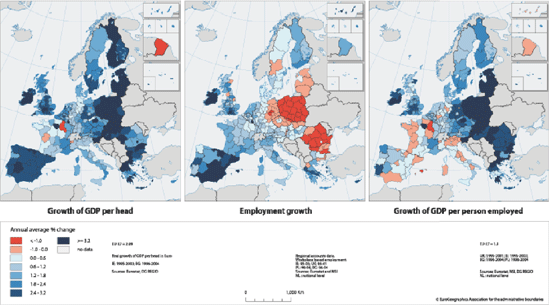
Map II. Research and Development indicators, 2004
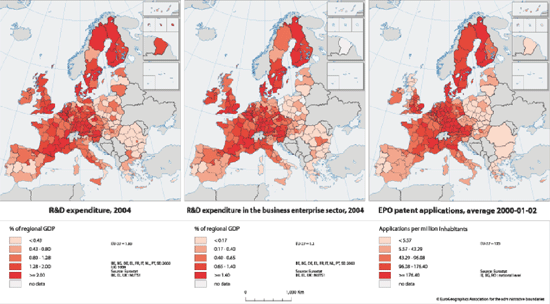
Map III. Lisbon Economic Indicators, 2004-2005
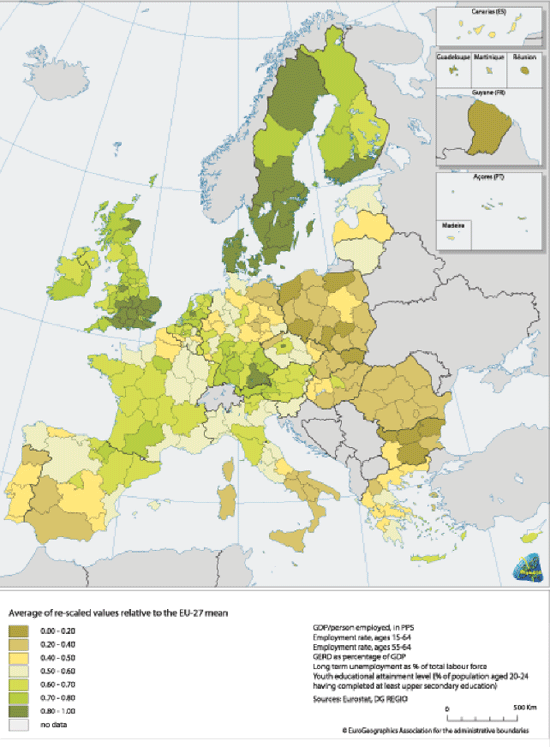
Mapa IV. Regional Innovation Performance Index, 2002-2003
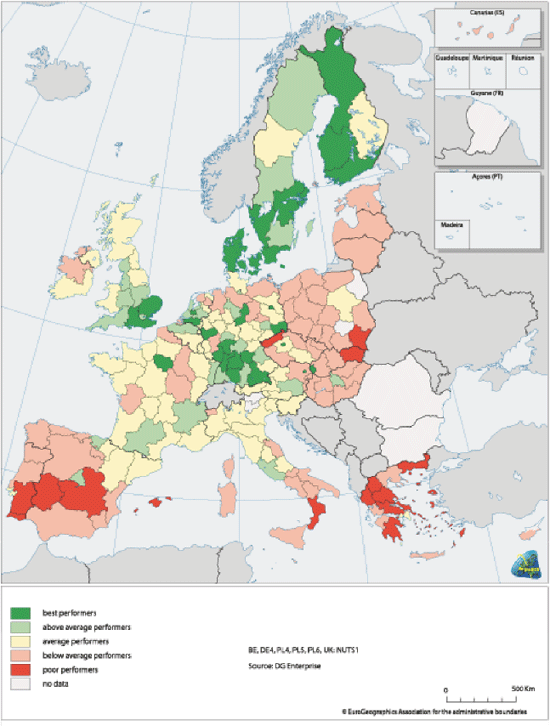
Bibliography
Barreiro, Belén, and Ignacio Sánchez Cámara (2001), ‘La europeización de la opinión pública española’, in Carlos Closa (dir.), La europeización del sistema político español, Istmo.
Da Conceição-Heldt, Eugénia (2006), ‘Integrative and Distributive Bargaining Situations in the European Union: What Difference Does It Make?’, Negotiation Journal, nº 22 (2), p. 145-65.
Dür, Alexander, & Gemma Mateo (2009), ‘Bargaining Power and Negotiation Tactics: The Negotiations on the EU’s Financial Perspective, 2007-2013’, Journal of Common Market Studies (upcoming).
Elgström, Ole, & Christer Jönsson (2000), ‘Negotiation in the European Union: Bargaining or Problem-Solving?’, Journal of European Public Policy, nº 7 (5), p. 684-704.
Navarro, M.A.,& C. Serrano Leal (2008), ‘El contexto de la negociación de las perspectivas financieras 2007-2013. España ante las nuevas perspectivas financieras’,Presupuesto y Gasto Público, nº 52, March, p. 9-23.
Serrano Leal, Cristina (2005), El Presupuesto Comunitario: Problemas presentes y retos futuros, Ed. Dykinson – Instituto de Estudios Europeos, Madrid.
Torreblanca, José I (2005),‘Farewell to Funds? Keys to Understanding Spain’s Position When Negotiating the 2007-13 EU Budget’, Working Paper nº 21/2005 (Translated from Spanish), Elcano Royal Institute, Madrid.
[1] Conclusions of the European Council of 19 December 2005: ‘(79) Europeans are living through an era of accelerating change and upheaval. The increasing pace of globalisation and rapid technological change continues to offer new opportunities and present new challenges. Against this background, the European Council agrees that the EU should carry out a comprehensive reassessment of the financial framework, covering both revenue and expenditure, to sustain modernisation and to enhance it, on an ongoing basis. (80) The European Council therefore invites the Commission to undertake a full, wide ranging review covering all aspects of EU spending, including the CAP, and of resources, including the UK rebate, to report in 2008/9. On the basis of such a review, the European Council can take decisions on all the subjects covered by the review. The review will also be taken into account in the preparatory work on the following Financial Perspective’.
[2] Alberto Navarro González, former Secretary of State for the EU, in ‘La Travesía Central Pirenaica va por el buen camino’, El Periódico de Aragón, 23/III/2008.
[3] See the Spanish contribution to the response to the European Commission issues paper at http//ec.europea.eu/budget/reform/issues.
[4] Address by Miguel Ángel Navarro, Secretary General for the EU, at the Seminar on Reforming the EU Budget, Madrid, 31/I/2008.
[5] In negotiations on financial prospects for 2007-13, the Spanish government defended three principles: (1) sufficiency, meaning a budget that allows the EU to achieve whatever goals it sets; (2) fairness, meaning an equitable distribution of the costs of EU enlargement; and (3) gradualness, meaning gradual departure from regions experiencing growth.
[6] Address by Alberto Navarro González, former Secretary of State for the EU, at the Fourth European Cohesion Forum, Brussels, 27/IX/2007.
[7] Unlike the case of the financial prospects for 2000-06, which was agreed at the European Council meeting in Berlin in 1999, the Inter-Institutional Agreement of the current financial framework (2007-13) makes reference to a clause on revising the EU budgetary system before the period ends and, to be more specific, in the year 2008/2009. Thus, the Commission must present an overhaul of all aspects of expenditure, including the Common Agricultural Policy, and of revenues, including the British rebate. The European Council will be able to make decisions on all of these issues. Debate on the reform of the EU budget began formally on 12 September when the Commission presented the so-called issues paper.
[8] See the Spanish response to the issues paper of the European Commission at http//ec.europea.eu/budget/reform/issues, and the speech by Miguel Ángel Navarro, Secretary General for the EU, at the Seminar on Reforming the EU Budget, Madrid, 31/I/2008.
[9] Institute for European Politics (Ed.), EU-27 Watch, nr 6, March 2008, p. 182.
[10] This circumstance features in a report prepared at the request of the European Parliament, the Deloitte Report (October 2007).
[11] According to the Deloitte report commissioned by the European Parliament in 2007, the UK, with 0.54%, is the country of the EU-27 that contributes the least, followed by Luxembourg (0.72%), Germany (0.78%) and Ireland (0.78%), whereas Spain contributes 0.98% of its GDP.
[12] Commission Statement (2007), Reforming the Budget, Changing Europe – Public Consultation on Revision of the Budget in 2008/2009, SEC(2007) 1188 final.
[13] General Secretariat for Budgets and Expenditures of the General Directorate for EU Funds (2007), Contribution to the Public Consultation Regarding the Fourth Cohesion Report – Cohesion Policy Prospects.
[14] The ultra-peripheral regions are characterised by their being a long distance the main EU market, having reduced local markets (often fragmented among several islands, which limits the possibility of achieving economies of scale), underdeveloped labour markets with few skilled workers and fragile ecosystems. Despite all this, some of these regions have posted major economic growth in recent years, while others continue to have serious problems in overcoming their structural weaknesses.
[15] See the contribution of the General Secretariat of Budgets and Expenditures of the General Directorate for EU Funds (2007) to the Public Consultation Regarding the Fourth Cohesion Report – Cohesion Policy Prospects.
[16] Ibid.
[17] Address by Luis Espadas, Secretary General for Budgets and Expenditures, at the Seminar on Reforming the EU Budget, Madrid, 31/I/2008.
[18] See Serrano Leal (2008), ‘La competitividad de la UE: un objetivo para 2014’, in Retos de la UE tras el Tratado de Lisboa, Escuela Diplomática, Madrid.
[19] European Commission (2007), Growing regions, Growing Europe, Fourth Report on Economic and Social Cohesion, p. 40, http://ec.europa.eu/regional_policy/sources/docoffic/official/reports/cohesion4/index_en.htm.
[20] As stated by the Secretary General for Agriculture, Josep Puxeu, in ‘Una mayoría de países rechaza una reforma radical de las ayudas agrícolas, según España’, publico.es, 18/II/2008.
[21] ‘Zapatero y Prodi buscarán mañana aunar políticas sobre la UE y Mediterráneo’, Agencia EFE, 4/XII/2007.
[22] Elgström & Jönsson (2000), Da Conceição-Heldt (2006) and Dür & Mateo (2009).
[23] Per capita income in 2007 is now very close to the EU average, according to Eurostat.



